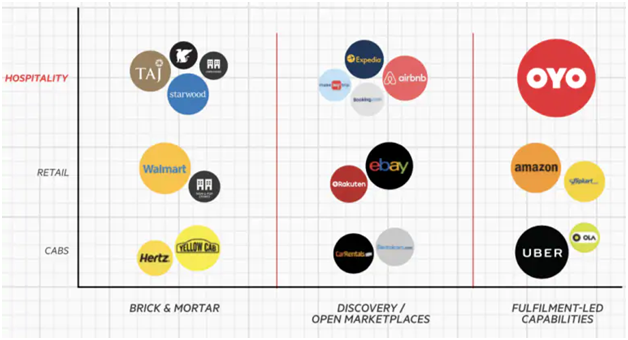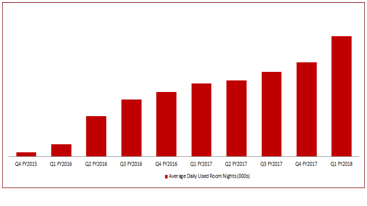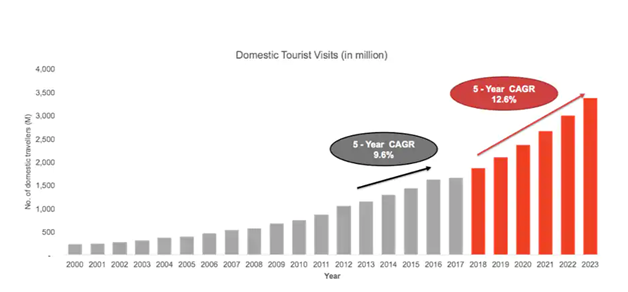IT Management Assignment: Utilization of Information Systems & New Business Models By OYO Rooms
Question
Task: Write a well-researched IT management assignment presenting how OYO rooms have the potential of disrupting the traditional hotel businesses with its disruptive business model.
Answer
Introduction
The concept of disruptive business model undertaken herein IT management assignment applies a business strategy to create new markets by making improvements or changes in the existing business model so that it can disrupt the market by addressing the repressed demands that have been ignored by the leading competitors and providing solutions that the competitors have failed to deliver (Aminoff, Valkokari, Antikainen&Kettunen, 2017). Disruptive organisations like Ola, Uber, and Lyft have harnessed the power of information systems for creating new business models and expressed a disruptive impact on the taxi business all over the world. However, the present study is based on the business of OYO rooms that is another business that has the potential of disrupting the traditional hotel businesses with its disruptive business model.
Discussion
Key information systems concepts and technologies in Oyo
It has been identified that Oyo rooms have revolutionized the legacy driven and fragmented budget hospitality space with the ability to empower the small asset owners with the capabilities that have enabled them to compete effectively with two to three stars hotel chains and therefore achieve greater occupancy. According to the reports in the recent time, Oyo has hosted from around the world over 20,000 franchised and leased hotels that include more than 45000-holiday homes, 700000 hotel rooms. Apart from that, every month more than 70000 rooms are added to the business globally (Oyorooms.com. 2020).

Figure.1: Businesses with disruptive business models in hospitality, retail and cab industry
(Source: Sharma, Jain, Kapoor, Gaur & Roy, 2017)
The strategy of the organization Oyo is to utilize the information systems and technologies to enhance the customer experience, elevate employee operational efficiency and support owner assets. On the basis of the innovative technologies and highly efficient information systems, Oyo has planned to upgrade all forms of real estate to provide quality living space to travellers all over the world. In the view of Sharma, Jain, Kapoor, Gaur & Roy, (2017), the adoption rate of new-age technologies like Artificial Intelligence (AI) in the hospitality industry is very high. However, technologies like barcode payments, mobile payments and cloud-based technologies are being slowly adapted to replace the cash deposits in the hotels. In this context, the organization Oyo has implemented the technology of machine learning for dynamic pricing when Natural Language Processing (NLP) and AI are helping it to provide excellent customer service. The technologies of machine learning and AI are also implemented in order to track multiple metrics like weather, locations, and local events and suggest the customers with different offerings as per their preferences. According to Devang, Kruse, Parker & Siren (2017), apart from changing the business model into a more personalized service offering to the customer’s AI can also be implemented in the future in order to simplify the process of audits in business, changing the business model into a more disruptive one. The hotel industry in Australia is becoming more competitive and there is also a little access to costs which has made the process of decision making regarding innovation more difficult (Patiar, 2016). In Australia Oyo face a huge competition from a similar online hotel booking organization AirBnB, which also have a similar type of business model.

Figure.2: Average daily room booking in Oyo
(Source: Oyorooms.com. 2020)
In addition to innovation in customer service, Oyo has also implemented information system innovations and technological innovations to ensure data security. New technologies such as Intrusion Prevention and Detection Devices (IPS and IDS), virtual private networks, static and dynamic code analysis are readily being used to ensure data security regarding the protection of the personal details of the customers as well as the business (Sarmah, Kamboj&Rahman, 2017). The organization implements these technological innovations through its Security Operations Center (SOC) that functions 24 hours a day. Moreover, in order to enhance the operational efficiency of the employees, the utilization of the Big data technology by Oyo can be regarded as a significant change to the business model. The technology is used for analysing data relating to user behaviour so that the implicit preferences of the customers can be learnt. The data relating to user behaviour is then used in order to provide guests with highly personalized hospitality experiences (UR and Padmarajan, 2020). Therefore, it can be said that the technological innovations and adoption of the changes in information systems has enabled Oyo to provide technology-based solutions with the mobile hotel technology for managing end to end operations starting from on boarding, transformation, customer service, to progress monitoring
The power of the information system to create a new business model and disrupt traditional businesses
Technology is regarded as the core of the growth rate of Oyo and the increased competitive advantage of the company in the global hospitality industry. According to Kesharwani and Kumar (2016), Oyo is the first hospitality company in the world that has invested in advanced and innovative technology and information systems for offering excellent customer experience and driving a sustainable business for the owners. The new business model of Oyo includes a partnership with different asset owners as well as hotels across the world for providing hotel rooms to the customers under their own brand. In order to choose partners, Oyo highly specifies its criteria that relate to the meeting of certain guidelines regarding rooms and services, staff quality, pricing, availability of security, and other room features. According to Nimri, Patiar&Kensbock(2017), the behavior of the Australian consumers regarding the hotel is changing toward green hotels. However, other traditional hospitality businesses implement a business model that is solely focused on the standard of the hotels and the pricing (Nandamuri, Rao& Mishra, 2020). Hence, technologies, innovations and information systems have become the core concept of the new business model of Oyo.

Figure.3: Compound annual growth rate of Oyo Rooms
(Source: Oyorooms.com. 2020)
As a result of the disruptive nature of Oyo’s business model, the organization has experienced an exponential rise in the sales of the Oyo rooms. As Oyo rooms partners with other unorganized as well as organized hotels, the greater rate of occupancies and spirit of income has resulted in a greater revenue generation that is multiple times of the other traditional hospitality businesses. The changes that have been incorporated by the Oyo Rooms in the hospitality industry are also stated to be digital disruption. According to Ferraz and Fernandez (2020), Digital disruption is the transformation which is caused due to the emerging digital technologies and new business models. The digital disruption introduced by Oyo Rooms in the hospitality industry has changed the way in which bookings are made by the customers as the mobile technologies for hotel booking is much easier to the customers than other types of hotel booking options.
Conclusion
From the above study, it has been identified that the Oyo and traditional hotel business paradigm is the next significant change resulting from the disruptive business model. Oyo room has implemented a range of new technologies and advanced information systems that have not only increased the satisfaction rate of the customers but also have changed the culture of hotel bookings all over the world. However, there are different other opportunities in relation to information systems and technologies such as AI and big data that the organization can use to significantly change the trends in the hospitality industry in the near future.
References
Aminoff, A., Valkokari, K., Antikainen, M., &Kettunen, O. (2017, April).Exploring disruptive business model innovation for the circular economy.InInternational Conference on Sustainable Design and Manufacturing (pp. 525-536).Springer, Cham.
Devang, A., Kruse, C., Parker, A., & Siren, P. (2017). The next wave of business models in Asia. MIT Sloan Management Review, 58(2), 35.
Ferraz, E., & Fernandez, G. (2020).RiteshAgarwal: Founder and CEO (Global), OYO Hotels & Homes. In Asian Founders at Work (pp. 75-89).Apress, Berkeley, CA.
Kesharwani, S., & Kumar, V. (2016). On your own: An OYO story A case study. International Journal of Engineering and Management Research (IJEMR), 6(5), 325-331.
Nandamuri, P. P., Rao, K. V. G., & Mishra, M. K. (2020). Sustainable Competitive Advantage Through Business Model Innovation: The Indian Perspective.IT management assignment In Disruptive Technology: Concepts, Methodologies, Tools, and Applications (pp. 191-213). IGI Global.
Oyorooms.com. (2020). Australia – OYO Hotels: Travel Blog. Oyorooms.com. Retrieved 11 April 2020, from https://www.oyorooms.com/blog/10-best-places-honeymoon-around-world-spend-best-time/stralia/
Oyorooms.com. (2020). Retrieved 11 April 2020, from https://www.oyorooms.com/officialoyoblog/wp-content/uploads/2017/07/chart-14.png
Oyorooms.com. (2020). Retrieved 11 April 2020, from https://www.oyorooms.com/officialoyoblog/wp-content/uploads/2019/02/CAGR.png
Sarmah, B., Kamboj, S., &Rahman, Z. (2017). Co-creation in hotel service innovation using smart phone apps: an empirical study. International Journal of Contemporary Hospitality Management.
Sharma, T. G., Jain, R., Kapoor, S., Gaur, V., & Roy, A. (2017). OYO Rooms: Providing affordable hotel stays. Emerald Emerging Markets Case Studies.
UR, H. K., &Padmarajan, A. (2020).A Study on the Role of Technology in Emerging Business Models in the Hospitality Industry with Special Reference to OYO Rooms.Our Heritage, 68(43), 342-348.
Patiar, A. (2016). Costs allocation practices: Evidence of hotels in Australia. Journal of Hospitality and Tourism Management, 26, 1-8.
Nimri, R., Patiar, A., &Kensbock, S. (2017). A green step forward: Eliciting consumers' purchasing decisions regarding green hotel accommodation in Australia. Journal of Hospitality and Tourism Management, 33, 43-50.












